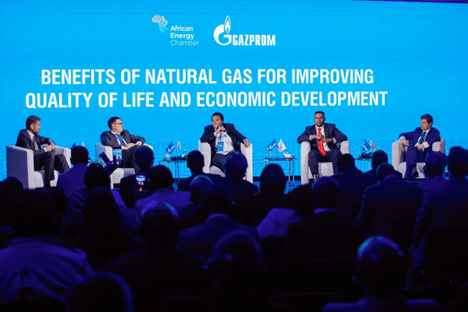The International Roundtable titled ‘The Benefits of Natural Gas for the Population and the Economy’ was held last week in Johannesburg (South Africa). The event took place under the African Energy Chamber’s auspices with support from Gazprom.
Ilya Rogachev, Ambassador Extraordinary and Plenipotentiary of the Russian Federation to the SAR and concurrently to the Kingdom of Lesotho; Dmitry Khandoga, Head of Department at Gazprom; NJ Ayuk, Chairman of the African Energy Chamber, as well as representatives of the business community, energy experts and journalists from across the African continent participated in the roundtable.
Participants discussed the role of natural gas in Africa’s sustainable development, noting that most African countries continue to face the problem of lacking energy availability – with their energy consumption significantly below the world average.
It is estimated that Africa will generate over 60 percent of global population growth by 2050. Taking into account the current urbanisation trend, the region is expected to experience significant economic growth that will be accompanied by a two-fold increase in energy consumption. In particular, the demand for natural gas will increase by 2.5 times.
It was highlighted at the event that an increase in natural gas production would help meet the growth in gas demand on the African continent. However, as of today the bulk of gas produced in Africa is exported abroad. For instance, every third person in Nigeria – the largest African LNG exporter – has no access to energy. This is why the availability of energy for industry and the population will be of primary importance for Africa’s dynamic development.
Participants of the Roundtable discussed the benefits of using natural gas as compared to other types of energy sources. It was noted that air pollution is a major concern for the continent. According to the statistics, polluted air is among the leading causes of premature death on the continent. This problem can only grow bigger over time. It was highlighted that all areas of activities making the biggest contribution to air pollution can be effectively addressed through the use of natural gas.
The potential role of gas in solving the food problem was also highlighted at the event. Besides the fact that using gas does not require large areas for electric power generation and does not lead to a reduction of cropped agricultural areas, gas is also a valuable raw material for production of the fertiliser that makes it possible to significantly increase crop yields.
Presentations were delivered at the roundtable by representatives of Gazprom and the Gazprom Group companies – namely Gazprom Gazifikatsiya, Gazprom Energoholding and Gazprom Helium Service. Their presentations provided information about the activities of Gazprom, and the Company’s extensive scope of competencies along the entire value chain of the gas business.
“Considering that the Republic of South Africa’s government pursues the economic decarbonisation policy, gas can become an effective solution to satisfy the demand for energy – as renewable energy sources cannot provide uninterrupted energy supplies. Therefore, I believe that Gazprom’s experience in natural gas liquefaction and gas pipeline construction projects can be of interest to our South African partners,” said Ilya Rogachev.
“Wider use of natural gas will help Africa solve a number of problems, from economic to social and environmental ones. We are confident that it is essential for Africa to discover all the advantages brought about by this type of fuel. We see potential in cooperation with African countries, and we can offer them our unique expertise and experience in technology. Gazprom is open to discuss constructive and mutually beneficial proposals which could facilitate economic development and improve the lives of people in African countries,” said Dmitry Khandoga.
“More than 600 million people in sub-Saharan Africa do not have electricity. And 900 million people, most of them women, do not have access to clean cooking technologies – these technologies are either absent or there is a shortage of them. Even if we look at this single problem alone, we see that it makes sense to use the continent’s rich gas resources. As Africa needs industrialisation, the use of affordable and abundant natural gas will encourage the creation of a significant number of jobs, as well as possibilities for strengthening potential, economic diversification and growth,” said NJ Ayuk.
Background
The African Energy Chamber is the African energy sector’s voice, and the continent’s largest organisation that brings together energy market players from Africa and from all over the world. Its main objective is to promote the continent’s energy development. The African Energy Chamber is headquartered in Johannesburg, South Africa.










